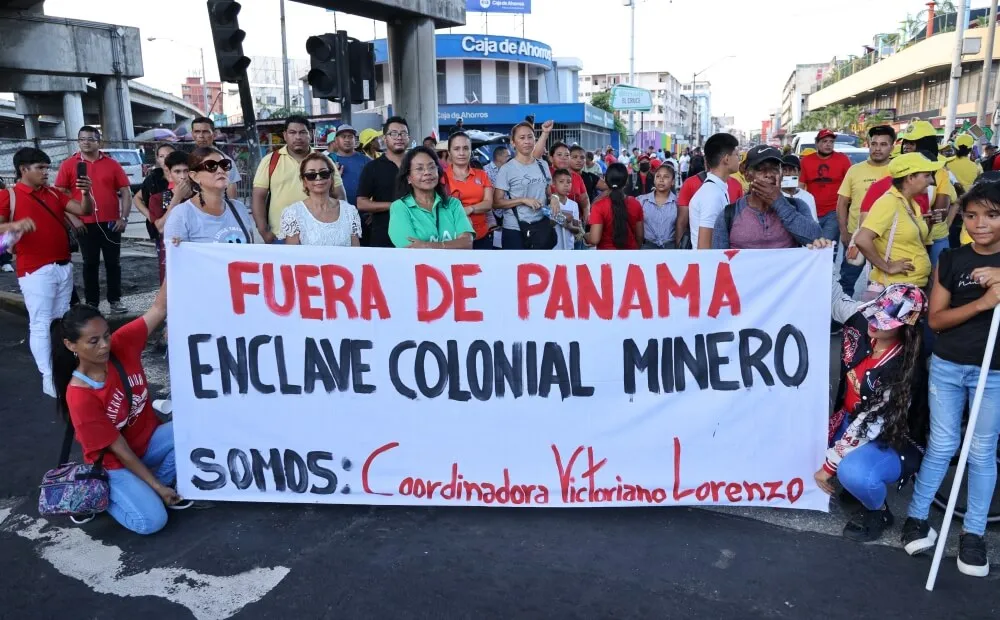“The people have spoken and expressed that they don’t want more mines, that they want sustainable economic development, and have no intention of destroying the country for profit,” said one campaigner.
By Brett Wilkins. Published 11-29-2023 by Common Dreams

Indigenous and environmental campaigners this week hailed a landmark win for the Rights of Nature movement, the Panamanian Supreme Court’s unanimous ruling that the contract for the Cobré mineral mine—one of the world’s largest—is unconstitutional and must be shut down.
The November 24 ruling against Minera Panamá, a subsidiary of the Canadian company First Quantum Minerals, followed weeks of nationwide protests against the open-pit mine, which began operations in 2019 and where mainly copper, but also gold, silver, and molybdenum, are extracted. Opponents say the mine threatens area water supplies. A gunman shot and killed two people at a protest against the mine earlier this month.
Last year, the Cobré mine produced over 86,000 tons of copper, approximately 1% of the world’s total production, 5% of Panama’s gross domestic product, and 75% of the Central American country’s export revenue. More than 2% of Panama’s workforce is employed at the mine.
Cobré—which is located in a biodiverse area on Panama’s Caribbean coast—will now shut down as a result of the ruling.
“The Panamanian people have spoken,” Kherson Ruiz, executive director of the London-based Sustainable Development Foundation, told Mongabay. “The people have spoken and expressed that they don’t want more mines, that they want sustainable economic development and have no intention of destroying the country for profit.”
#Panama | The Supreme Court declared "unconstitutional" the concession contract for the largest copper mine in Central America, whose approval in Congress unleashed protests that have kept the country paralyzed for more than a month. pic.twitter.com/uvmlat3RlI
— teleSUR English (@telesurenglish) November 28, 2023
Referring to his introduction of Panama’s Rights of Nature law, Juan Diego Vásquez Gutiérrez, an independent—and, at age 27, the youngest—member of Panama’s National Assembly, said Wednesday that “I am very happy to have been part of a fundamental legal instrument to end the metal mining industry in the country.”
“This is one of many tangible effects that we must repeat in defense of the environment thanks to legislation like this,” Vásquez added.
Rengifo Navas Revilla, secretary of the National Coordinator of Indigenous Peoples of Panama, said in a statement that “when all this nature is contaminated, we all die.”
“Even the planet itself, even Mother Earth herself, dies,” he added. “This is the principle that has been instilled in us and that is why we continue to fight.”
BREAKING: In a huge win for the planet, Panama's top court just shut down one of the world's largest copper mines after months of Indigenous-led protests. The mining company then lost $8 billion in market value.
— Steven Donziger (@SDonziger) November 28, 2023
Courts respond to citizen pressure.⤵️https://t.co/SDLUmYOi7w pic.twitter.com/t0RRQyFJUT
Since Ecuador became the first country to constitutionally enshrine the Rights of Nature in 2008, more than 30 nations have taken similar actions to protect their environment.
The advocacy groups Leatherback Project and Earth Law Center noted Wednesday that the Panamanian ruling “comes after a similar blocking of a copper mine earlier this year in Ecuador, where a provincial court ruled a mining project violated the constitutional Rights of Nature in the Intag Valley of the tropical Andes.”
Constanza Prieto Figelist, Latin America legal director at Earth Law Center—which provided input and expertise on the Rights of Nature as the law was being drafted—said of the Panama ruling that “this case demonstrates that under a Rights of Nature framework, governments must give stronger consideration to the health and intrinsic value of nature when overseeing mining and other activities, elevating the interests of species and ecosystems to a higher status alongside human interests.”
“The case also shows that the Rights of Nature can be an effective tool to protect the environment where traditional laws might fall short,” she added. “We hope this will inspire other governments to give nature a formal voice and rights in the legal system, as Panama did.”
This work is licensed under Creative Commons (CC BY-NC-ND 3.0).

